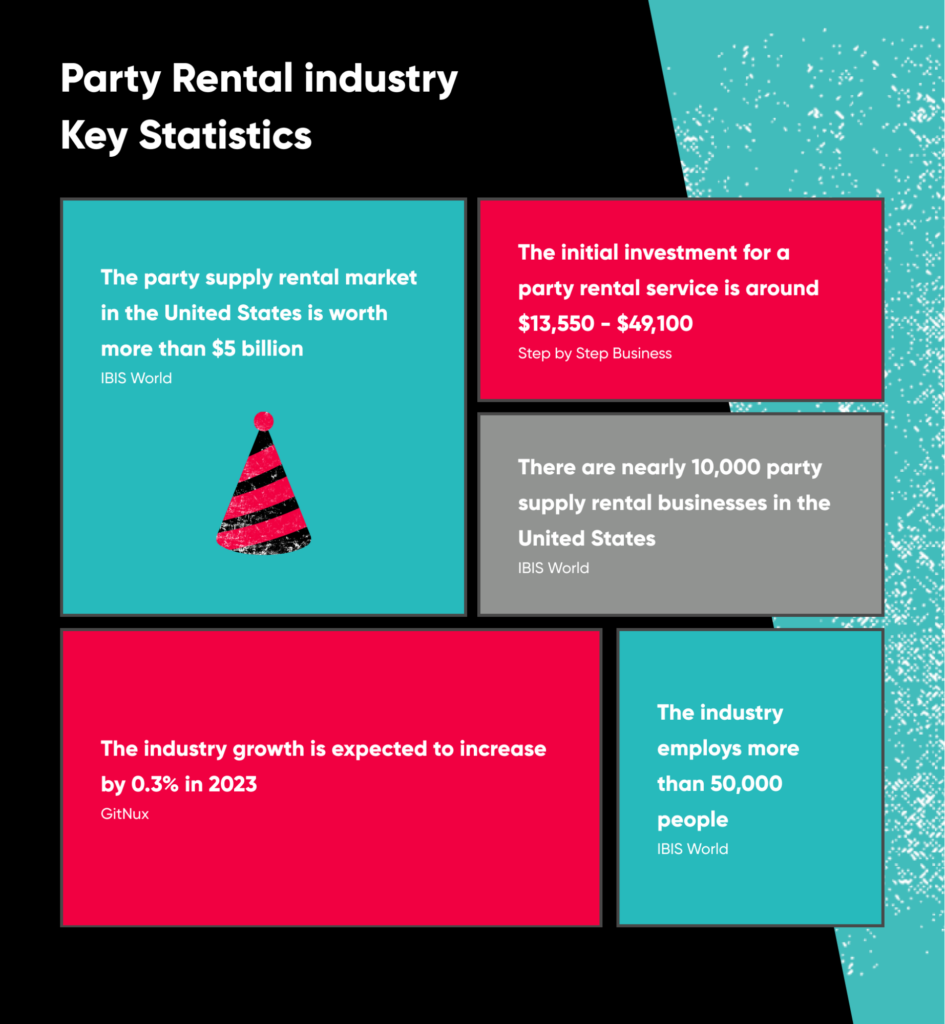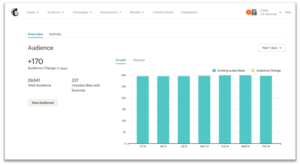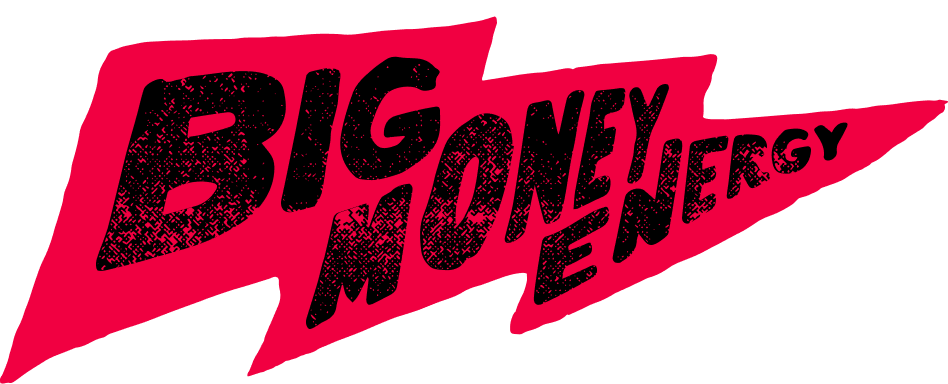
Parties: not just fun, but profitable, too.
That is if you own a party rental business.
Okay, we get it: renting out tables, chairs, and tents doesn’t sound like the sexiest business proposition ever.
But the party rental industry is worth over $6 billion.
And these companies have an enduring business model. You buy something once and then rent it out for profit over time. You end up making far more than the original purchase price of the item after a few rentals.
Here’s another bonus: These companies are not that hard to operate once you get the equipment, marketing, and software in place.
But getting to that point is challenging for new business owners. Finding someone else who worked out all the kinks makes it much easier.
Here are the steps to follow if you want to start a party rental business and why buying one is a much better way to cash in on the demand.
Why Buy a Party Rental Business Instead?

One of the biggest challenges of starting a party rental business is getting the perfect balance of equipment that people want while maximizing your budget. You don’t want to invest dollars in things people never rent or get phone calls asking you for items you didn’t buy.
Party rental businesses face multiple challenges beyond finding the right type of equipment, including:
- Wear and tear/maintenance on the items
- Safety and liability concerns
- Some items are more seasonal than others
- Storing the equipment and transporting it to events
If you find someone else with the equipment on hand and operations on autopilot, you can start making money a lot faster. An established business is a proven one.
An existing business owner has already figured out how to deal with the unique recurring challenges of the business and has brand awareness you can build on once you take over.
If you scope it out online, you’ll find party rental businesses for sale on marketplaces like BizBuySell or Dealstream. You can also use networking or BizScout, a tool we own, to find off-market deals.
Even better, you can use seller financing to get behind the wheel of one of these businesses on better terms than most bank loans.
But if your heart’s set on starting your own party rental business, the steps below will show you how.
1. Chart Your Course with Market Research
Any new business owner should start by defining their customers and service offerings before launching. Ask yourself 2 questions to start with:
- Will you rent out to mostly residential or commercial clients?
- Will you niche down on one event type or serve a variety?
Then, look at all the party rental companies in your area or nearby areas. Make lists of what they rent out and any target markets. As you do this, look for gaps that they don’t serve.
Here are some things to look for:
- What party items aren’t available from competitors?
- How much do they cost to rent?
- Which companies struggle with digital marketing?
- Which ones seem hard to get a hold of from a customer’s perspective?
- What do reviews from past customers have to say about them?
Looking at these factors will give you an idea of market demand. It’ll also show you any potential underserved needs and ways you can improve upon the competition’s offers.
Buying an established party rental business is a shortcut through the market research process. An ideal business to buy has already answered all of these questions.
When you take the reins, you can compare the business’s performance to what the market wants. Then, you can develop a plan to make the existing business a better fit for the market.
2. Craft a Winning Business Plan
It’s well worth writing a thorough business plan to cover all aspects of your new startup, including:
- A summary of the target market you will serve
- A list of the equipment you need (including your plan for storage and transportation)
- Your cost estimates for starting and ongoing operations
- Your pricing structure and service offering
- Your marketing plan
Don’t skimp on your business plan. This is the guiding document for your business, so put real thought into it. Plus, you’ll need to present it to banks or investors if you need outside financing.
Buying an established business means you take over their business plan, too. You can take a look at what’s working for them and modify the business plan to suit your goals for the company.
3. Navigate Legal and Regulatory Hurdles

Any new business must at least register as a company with the secretary of state. You may also need a business license depending on where and how you operate your business.
When you register, you’ll declare your business structure and claim your business name.
The simplest structure option is to register as a sole proprietorship. But sole offers no liability or tax benefits.
Since you’ll join an industry with some liability concerns, forming an LLC or a corporation is a better way to protect your personal assets.
Your state or local government might require special licensing and permits, too. Check out a reseller’s ID if you’ll buy any items that potential customers may purchase.
While you’re setting up all your licenses and registration, buy insurance to protect yourself from unforeseen events.
At a minimum, get policies for:
- General liability insurance
- Car insurance for any company vehicles
- Business interruption insurance (if you experience a sudden halt in business)
- Workers’ compensation insurance for any employees
Jumping through legal hurdles is important for a business. You can cut down on regulatory downtime by buying a business that already has its ducks in a row.
4. Determine What You Need in Your Inventory and Secure Financing
You need things to rent, so plan for your startup budget carefully.
What you choose depends on your niche.
You may start small and grow over time, so consider going with basics like tables, chairs, linens, and decor. If you’re doing kids’ parties, you might want to go with inflatables and games instead.
You’re looking for functional and durable materials when you buy for a party rental business. This holds true no matter what niche you go into.
These items may get a lot of use indoors or outdoors, so you want something that stands the test of time.
When you order your inventory, make sure you have sufficient space to store them. If you don’t have a vehicle to move the rental items from your storage to a party’s location, you’ll need to plan for that, too.
In the interim, you could always rent a truck on the day of until you make enough money to get your own.
Don’t forget to include things like your rental space and any salaries you’ll pay in your startup budget, too.
Once you know what you need, secure financing for your new business. That may include a mix of:
- Personal funds like loans, credit cards, or savings
- Business or bank loans, such as from the SBA
- Investor funds
Each of these comes with their own pros and cons.
With your personal funds, you take on all of the risks. With loans, you need to start making money fast to pay down your debt. And with investors, you end up sacrificing some of your profit to a partner.
But you can use seller financing to get the deal done if you buy a party rental business from someone else.
That may come with better terms than the other options. And you get all the equipment you need to start. That eliminates a lot of work and risk upfront.
5. Streamline Your Business Operations
Smooth operations make an enjoyable business. And operationalizing also turns your business into something you can hand off to a full-time employee to run the day-to-day.
A few things you need to get regular bookings and keep things running:
- A website with photos of all your equipment and the specs/sizes of each
- A maintenance plan to ensure you get the maximum life out of your materials
- Software to organize inventory flow (like Booqable and GoodShuffle)
- Software for invoicing and accounting purposes
- Training for staff on customer service, equipment handling, and safety
Renting out party equipment seems simple, but you really need staff to help you run at scale. Even one full-time operator could handle scheduling, transport, and customer service for you.
You may also need contractors to help load/unload at each site to speed things up.
As you book gigs, listen to feedback and incorporate comments from customers. Encourage happy customers to leave reviews, too.
When you buy a business, you get the operations infrastructure, too. Some businesses might be behind the times and require modernizing. But, even then, you’ll start out with something that’s already operational.
6. Market and Promote Your Rental Business
A memorable brand makes it so much easier to generate new and repeat business in the party rental world. Start with a good name and a clear business logo.
But “build it and they will come” doesn’t work in any business. Invest in local advertising and online marketing to let people know who you are and what you do.
For your online presence, set up a business website that:
- Showcases what you have to offer with reviews and photos
- Makes it easy to contact you (or even book things directly)
- Answers common questions from customers
Your website should also touch on the event types for SEO purposes. Make it clear who you serve on your home page and create a service landing page for each event type you cater to.
For example, you might create a page for graduation parties, weddings, birthdays, or retirement parties, depending on your service offerings.
You can also use social media and a Google Business profile to share a lot of the same information while also capturing reviews.
Local advertising is key, too.
Community events like concerts, parties, or festivals need equipment, and forming a relationship with these event planners could lead to repeat business.
You might even partner with other related business owners, such as caterers, to win gigs together.
If you buy the party rental company from a successful business owner, you can leverage their existing marketing and customer awareness. The business that existing marketing efforts bring in will buy you space to try out new ideas.
Next Steps: Tips for Growing Your Party Rental Business
After you book gigs frequently, it’s time to think about scaling. There are a few ways to do that with your party rental company, including:
- Diversifying into new equipment like tents or bounce houses
- Getting into new niches, like kid’s parties
- Expanding your business to new locations or franchising out
In order to do this, make sure you’re on solid operational ground with staff who can handle most issues and software that streamlines most of the logistics.
If you buy into the party rental business instead of starting your own, you’ll focus on this step at the very beginning, looking for ways to optimize.
Party On
If you buy good materials and maintain them, purchasing things once to rent out over and over again is a great business idea. You’ll earn back your investment and more in a high-demand business.
Since party rental business owners face some challenges in the early days, you can boost your chances of success by buying into someone else’s established company. Using seller financing to secure all the equipment, vehicles, and staff, you can earn revenue from day one.




